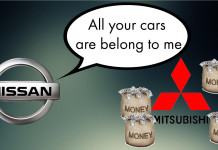Nissan Motor on Thursday said it would start building its zero-emission Leaf electric car at a plant in Britain from 2013, saving more than 2,000 jobs in one of England’s most deprived regions.
The factory in Sunderland, northeast England, will also make the vehicle’s lithium-ion batteries and will be the third earmarked to produce the clean cars after plants in Oppama, Japan and the US state of Tennessee.
The investment of more than 468 million euros (642 million dollars) will help maintain about 2,250 jobs at Sunderland and across Nissan’s British supply chain, the Japanese company said.
British Business Secretary Peter Mandelson said: “This investment is a fantastic vote of confidence in the Sunderland plant and its excellent workforce.”
According to a Nissan statement, he said that “by working together we can achieve our aim of making the UK a world leader in ultra-low carbon vehicles”.
Initial output will be about 50,000 vehicles a year from early 2013. The Leaf is due to go on sale worldwide this year with production beginning in Japan, while the US factory will start making them in 2012.
Nissan bills the Leaf electric vehicle (EV) as “the world’s first affordable, mass-produced zero emission car”.
The five-seater hatchback has a range of 160 kilometres (100 miles), can be rapid-charged to 80 percent of its battery capacity in 30 minutes, and travels at a top speed of more than 140 kilometres (90 miles) per hour.
The Sunderland car plant, Britain’s largest, has since 1986 produced 5.6 million vehicles, including 338,000 last year, with a workforce of 4,100.
In January, Nissan said it was shedding 1,200 jobs at the plant as it battled to cope with a downturn in sales caused by the global economic crisis, worsening joblessness in England’s worst unemployment black-spot.
Nissan said construction of its battery plant at Sunderland would begin next month. With a capacity of 60,000 units a year, it will start making batteries in 2012 for both Nissan and its French alliance partner Renault.
While Britain supported the Leaf project financially, Nissan also said the government’s environmental policy was “very much in line” with its own and Renault’s thinking.
The investment will be supported by a 20.7-million-pound grant from the British government and a proposed finance package from the European Investment Bank of up to 220 million euros.
Nissan has other European plants in Spain, but the firm has sharply reduced output there as the country slumped into recession. One plant at Avila is to run at less than 50 percent capacity for at least three years.
Last December, Nissan and the regional development agency covering northeast England signed an agreement to supply the Leaf within the region from 2011 and to develop a network of electric-charging points.
Under the deal, early EV adopters will be offered a range of incentives, such as a period of free charging and dedicated road lanes.
Zero-emission cars are gaining traction as environmentally conscious drivers look for alternatives to petrol cars, whose emissions pollute cities and are blamed for being a major contributor to global warming.
Japanese car makers have been world leaders. Mitsubishi Motors last year rolled out the i-MiEV at home, and Fuji Heavy the Subaru Plug-in Stella.
Toyota, which has focused on petrol-electric hybrids, has promised to launch its own EV by 2012 and last year started leasing a plug-in electric vehicle, one year earlier than initially planned.
The world’s biggest automaker, however, has been hit by a global safety recall affecting a range of models including its flagship hybrid, the Prius.











